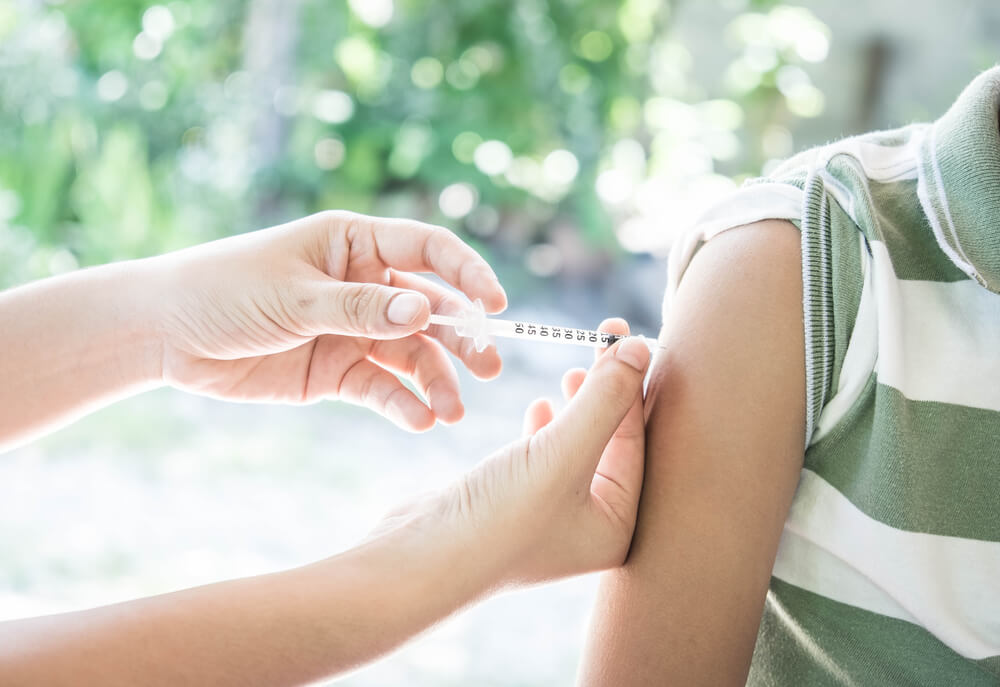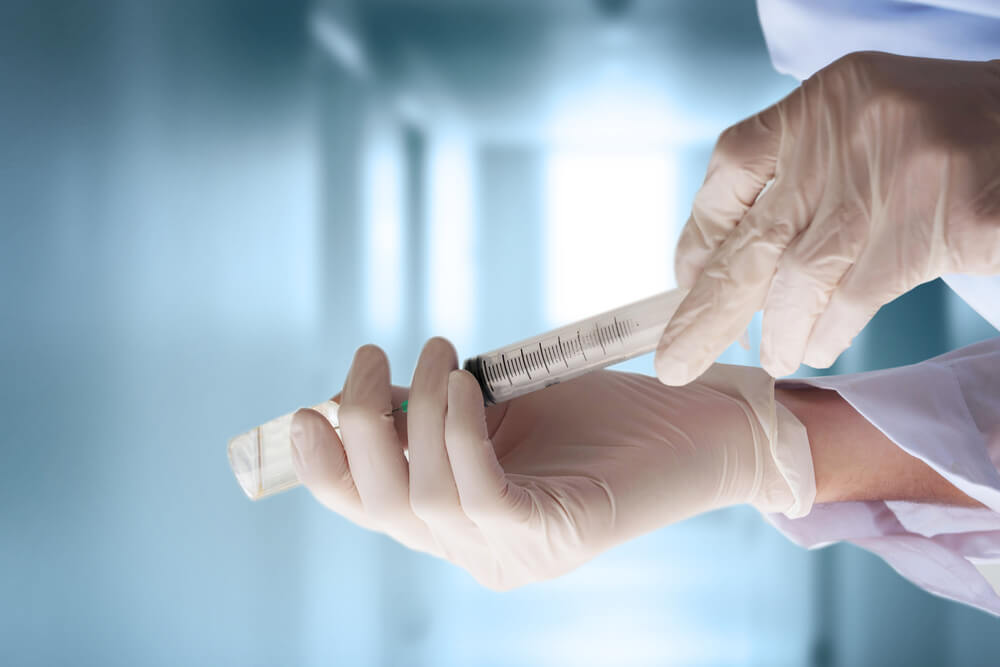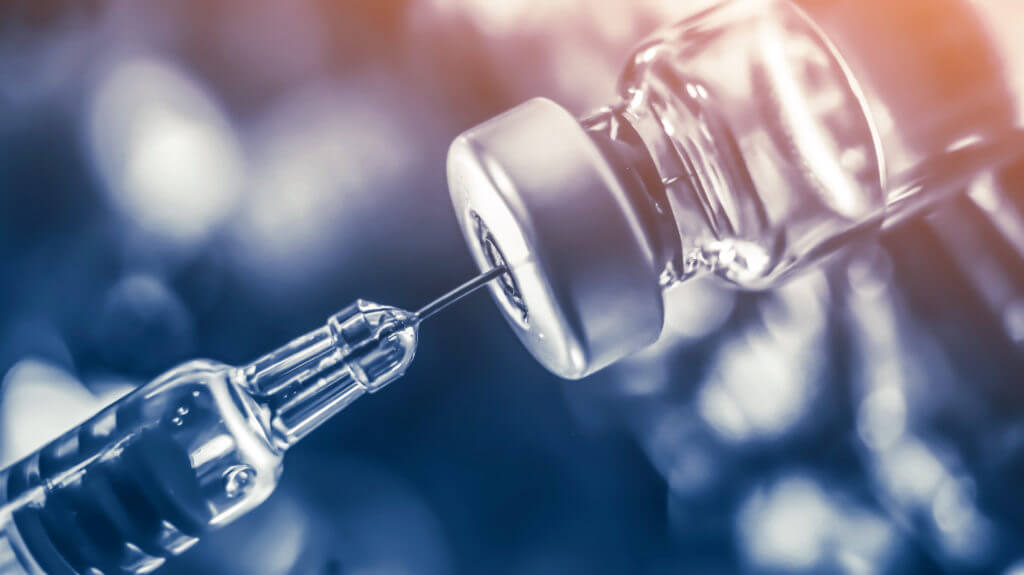
Guillain-Barré Syndrome Triggered by a Vaccine
Reviewed By Anne Carrión Toale, Vaccine Injury Attorney
What is Guillain-Barré Syndrome?
Guillain-Barré Syndrome (GBS) is a disorder that causes a patient’s immune system to go haywire and attack its own peripheral nervous system (World Health Organization). GBS is also referred to as Acute Inflammatory Demyelinating Polyneuropathy (AIDP).
Symptoms range from a feeling of pins and needles to complete paralysis and can begin anywhere from a few days to several weeks after vaccination. However, symptoms usually peak around one to two weeks after the vaccine is given.
The flu vaccine is associated with an increased risk of hospitalization from GBS (Juurlink et al., 2006). The chronic version of GBS is known as Chronic Inflammatory Demyelinating Polyneuropathy, or CIDP.
IMPORTANT: This information does NOT apply to injuries from the COVID-19 vaccine.

We’ve Won More than $85 Million in GBS Vaccine Injury Awards for our Clients
Vaccines That Commonly Trigger Guillain Barré Syndrome
The Flu Vaccine and GBS
Researchers who study vaccine reaction rates find that “GBS is more strongly associated with the flu vaccine” compared to any other type of immunization.
The Journal of the American Medical Association cites Guillain Barré as the most frequent neurological condition reported after getting the flu vaccine.
HPV Vaccine and GBS
There is evidence that the HPV (human papillomavirus) vaccination can trigger Guillain Barré Syndrome.
The Centers for Disease Control (CDC) says Guillain Barré has been reported after the HPV vaccination.
Other studies show that 72% of patients who reported GBS symptoms after an HPV vaccine experienced those symptoms within 6 weeks after their vaccination.
What To Do if You Get Guillain Barre Syndrome from a Vaccine Reaction?
- Hire a vaccine injury lawyer to file your claim.
- Get a copy of your vaccine record.
- Get a copy of your first doctor’s visit for GBS symptoms.
- Your attorney files your claim in the VICP.
- You pay no legal fees ever.
- You keep 100% of any money won. There is no contingency fee to share with your lawyer.
- Find out more about the VICP legal process
For more information, complete our online contact form or call our office at (888) 952-5242 to speak directly with someone

Did You Get GBS After a Vaccine?
There is a time limit to file a claim, so don’t wait.
We may be able to help if you got GBS from a vaccination.
Having Trouble Deciding Who Will Represent You in Your Vaccine Case?
We make it easy with our simple guide to choosing the right lawyer for your vaccine case.
How Our Vaccine Attorneys Can Help
Mctlaw currently represents hundreds of patients across the United States who are suffering from Guillain-Barre Syndrome triggered by a vaccine reaction.
Our law firm’s vaccine attorneys obtain compensation for patients with vaccine injuries by filing a lawsuit in the United States Court of Federal Claims in Washington, D.C. The outcome of the lawsuit determines what kind of compensation a victim may receive.
Very few attorneys are able to practice law before the Federal Vaccine Court. That’s why you should hire an attorney with extensive experience in this area of law. These are NOT simple personal injury cases.
Our Guillaín-Barre Syndrome Case Result Amounts
| Amount | Vaccine | Link to Court Decision | Date |
|---|---|---|---|
| $275,000.00 | Flu | Case 22-0586V | 5/16/25 |
| $200,539.37 | Flu | Case 24-1356V | 4/24/25 |
| $152,788.49 | Flu | Case 23-1885V | 2/27/25 |
| $135,938.14 | PCV | Case 17-1254V | 2/7/25 |
| $120,000.00 | Flu | Case 22-0673V | 1/17/25 |
| $130,242.27 | Flu | Case 23-2101V | 1/16/25 |
| $200,000.00 | Flu | Case 21-2078V | 12/30/24 |
| $832,779.17 | Flu | Case 21-2065V | 12/18/24 |
| $165,456.13 | Flu | Case 23-2105V | 12/5/24 |
| $180,000 | Flu | Case 20-491V | 11/22/24 |
| $123,415.40 | Flu | Case 24-0296V | 11/14/24 |
| $115,045.64 | Flu | Case 22-646V | 10/17/24 |
| $205,490.64 | Flu | Case 23-562V | 10/17/24 |
| $197,727.64 | Flu | Case 23-0498V | 10/1/24 |
| $75,000 | Flu | Case 21-1491V | 9/10/24 |
| $100,000 | Flu | Case 19-670V | 9/5/24 |
| $93,309.17 | Flu | Case 23-1771V | 8/19/24 |
| $139,006.55 | Flu | Case 22-1314V | 8/14/24 |
| $122,500 | Flu | Case 22-1034V | 8/5/24 |
| $512,170.03 | Flu | Case 23-0798V | 5/31/24 |
| $189,510.57 | Flu | Case 22-879V | 4/29/24 |
| $135,000.00 | Flu | Case 23-65V | 1/25/24 |
| $105,000.00 | Flu | Case 22-695V | 1/16/24 |
| $189,245.05 | Hepatitis A | Case 20-664V | 1/3/24 |
| $128,387.79 | Flu | Case 22-1259V | 12/29/23 |
| $163,519.91 | Flu | Case 21-2118V | 12/28/23 |
| $256,691.70 | Flu | Case 22-1306V | 12/7/23 |
| $200,000.00 | Flu | Case 22-776V | 11/3/23 |
| $142,711.75 | Flu | Case 23-88V | 10/26/23 |
| $77,500.00 | Hepatitis B | Case 19-0260V | 10/24/23 |
| $225,377.85 | Flu | Case 21-2322V | 10/12/23 |
| $90,000.00 | Flu | Case 22-217V | 10/10/23 |
| $117,961.41 | Flu | Case 21-1671V | 10/3/23 |
| $135,000.00 | Tetanus | Case 22-498V | 9/26/23 |
| $154,813.96 | Flu | Case 21-1655V | 9/25/23 |
| $182,223.01 | Flu | Case 21-2252V | 8/4/23 |
| $157,264.04 | Flu | Case 21-2226V | 6/29/23 |
| $101,875 | GBS with Miller-Fischer | Case 22-1099V | 6/27/23 |
| $222,500 | GBS | Case 21-1748V | 6/14/23 |
| $45,000 | GBS | Case 21-885V | 6/12/23 |
| $177,077 | GBS | Case 21-2088V | 6/7/23 |
| $110,000 | GBS | Case 22-640V | 5/8/23 |
| $105,830 | GBS | Case 21-2205V | 3/31/23 |
| $48,000 | GBS | Case 20-1201V | 3/28/23 |
| $142,298 | GBS | Case 20-165V | 3/21/23 |
| $297,784 | Flu | Case 20-1807V | 2/22/23 |
| $142,929 | TDAP | Case 20-1807V | 1/13/23 |
| $405,000 | Influenza Vaccine | Case 22-31V | 10/14/22 |
| $156,805 | Influenza Vaccine | Case 21-1711V | 8/8/22 |
| $147,513 | GBS | Case 19-725V | 5/25/22 |
| $230,000 | GBS, CIDP | Case 19-1574V | 4/5/22 |
| $212,705 | Influenza | Case 19-0107V | 1/28/22 |
| $3,750 | Influenza | Case 19-68V | 1/20/22 |
| $83,291 | Tdap | Case 20-1004V | 12/21/21 |
| $117,450 | Influenza | Case 20-1198V | 9/21/21 |
| $162,260 | Influenza | Case 20-1206V | 9/3/21 |
| $244,390 | Influenza | Case 19-0277V | 8/31/21 |
| $137,675 | Influenza | Case 20-0334V | 8/17/21 |
| $243,207 | Influenza | Case 18-1850V | 8/12/21 |
| $195,243 | Influenza | Case 19-298V | 8/11/21 |
| $62,500 | TDaP | Case 19-607V | 5/25/21 |
| $60,000 | TDaP | Case 20-392V | 5/12/21 |
| $220,004 | Influenza Vaccine | Case 20-0912V | 5/4/21 |
| $166,260 | Influenza Vaccine | Case 19-0207V | 4/12/21 |
| $115,164 | Influenza Vaccine | Case 19-971V | 4/6/21 |
| $280,447 | Influenza Vaccine | Case 19-474V | 3/30/21 |
| $166,260 | Influenza Vaccine | Case 19-0207V | 3/16/21 |
| $300,705 | Influenza Vaccine | Case 18-1431V | 3/15/21 |
| $60,000 | Tdap Vaccine | Case 19-223V | 1/26/21 |
| $68,787 | Influenza Vaccine | Case 19-359V | 1/12/21 |
| $90,081 | Influenza Vaccine | Case 19-0601V | 1/11/21 |
| $154,700 | Influenza Vaccine | Case 19-1504V | 12/15/20 |
| $139,825 | Influenza Vaccine | Case 19-485V | 11/6/20 |
| $120,000 | Influenza Vaccine | Case 18-976V | 10/1/20 |
| $428,400 | Influenza Vaccine | Case 18-588V | 9/30/20 |
| $280,876 | Influenza Vaccine | Case 18-1834V | 9/29/20 |
| $149,411 | Influenza Vaccine | Case 19-0866V | 9/18/20 |
| $200,000 | Tdap Vaccine | Case 19-523V | 9/11/20 |
| $1.8 Million | Influenza Vaccine and Hepatitis B Vaccine | Case 16-120V | 9/9/20 |
| $165,114 | Influenza and Tdap Vaccines | Case 18-88V | 8/27/20 |
| $180,000 | Influenza Vaccine | Case 19-0191V | 8/7/20 |
| $96,250 | Influenza Vaccine | Case 19-0082V | 7/23/20 |
| $1.1 Million | Influenza Vaccine | Case 18-0233V | 7/20/20 |
| $62,808 | Influenza Vaccine and Hepatitis A Vaccine | Case 18-0600V | 7/2/20 |
| $150,000 | Influenza Vaccine | Case 17-1466V | 6/16/20 |
| $167,499 | Influenza Vaccine | Case 18-1045V | 6/12/20 |
| $240,000 | Influenza Vaccine | Case 18-1356V | 5/26/20 |
| $700,000 | Influenza Vaccine | Case 17-1293V | 5/19/20 |
| $180,000 | Influenza Vaccine | Case 18-1651V | 5/19/20 |
| $128,358 | Influenza Vaccine | Case 18-1653V | 5/13/20 |
| $175,500 | Influenza Vaccine | Case 18-805V | 4/21/20 |
| $90,000 | Tdap Vaccine | Case 18-1866V | 4/21/20 |
| $167,500 | Influenza Vaccine | Case 18-0810V | 4/15/20 |
| $185,807 | Influenza Vaccine | Case 17-1808V | 3/25/20 |
| $123,953 | Influenza Vaccine | Case 18-0817V | 2/10/20 |
| $159,960 | Tdap Vaccine | Case 17-1184V | 2/6/20 |
| $252,000 | Influenza | Case 17-1829V | 9/19/19 |
| $178,500 | Flu | Case 18-768V | 9/17/19 |
| Lifetime Annuity | Flu | Case 17-1479V | 8/30/19 |
| $175,000 | Flu | Case 18-127V | 8/27/19 |
| $115,000 | Flu | Case 18-188V | 8/15/19 |
| $455,000 | TDaP | Case 16-27V | 6/24/19 |
| $65,000 | Hepatitis B | Case 17-515v | 6/17/19 |
| $85,000 | Flu | Case 17-1310v | 5/29/19 |
| $151,000 | Flu | Case 17-1761V | 5/22/19 |
| $577,500 | Flu | Case 17-779V | 5/16/19 |
| $90,000 | Flu | Case 17-780v | 3/11/19 |
| $525,600 | Flu | Case 17-0175v | 3/5/19 |
| $175,000 | Flu | Case 17-53V | 1/23/19 |
| $102,000 | Flu | Case 17-1320V | 12/10/18 |
| $115,000 | Influenza | Case 17-1209V | 11/30/18 |
| $170,000 | Flu | Case 16-1627v | 9/27/18 |
| $50,000 | Flu | Case 16-1672V | 9/27/18 |
| $50,000 | Influenza | Case 16-1672V | 9/27/18 |
| $160,000 | Influenza | Case 17-636V | 9/27/18 |
| $180,000 | Flu | Case 17-1414v | 9/21/18 |
| $115,000 | Influenza | Case 17-0647v | 9/20/18 |
| $231,335 | Influenza | Case 17-922V | 7/27/18 |
| $100,000 | Pneumococcal | Case 16-1315V | 7/3/18 |
| $245,000 | Influenza | Case 10-515V | 5/22/18 |
| $500,500 | Influenza | Case 16-527v | 5/17/18 |
| $130,000 | Tetanus-Diptheria Acellular Pertussis (Tdap) | Case 16-15V | 5/17/18 |
| $115,000 | Influenza | Case 16-0574V | 2/5/18 |
| $235,000 | Tdap Vaccine | Case 16-752V | 1/2/18 |
| $125,000 | Tdap and Influenza Vaccines | Case 16-1081V | 11/13/17 |
| $328,638 | Influenza Vaccine | Case 16-1476V | 10/23/17 |
| $683,309 | Flu Vaccine | Case 15-22V | 10/19/17 |
| $523,454 | Influenza Vaccine | Case 15-908V | 10/13/17 |
| $120,000 | Influenza | Case 16-1562V | 9/27/17 |
| $140,000 | Influenza Vaccine | Case 16-874V | 9/1/17 |
| $180,720 | Influenza Vaccine | Case 16-1679V | 8/25/17 |
| $850,000 | TDaP | Case 12-124V | 8/23/17 |
| $125,000 | Influenza Vaccine | Case 16-132V | 8/11/17 |
| $355,000 | Flu Shot | Case 16-564V | 8/8/17 |
| $195,000 | Influenza Vaccine | Case 16-1040V | 8/7/17 |
| $431,367 | Influenza Vaccine | Case 16-1091V | 8/7/17 |
| $325,000 | Tetanus Diphtheria Acellular Pertussis (Tdap) | Case 16-902V | 6/16/17 |
| $193,000 | Influenza | Case 16-153V | 6/13/17 |
| $165,000 | Influenza Vaccine | Case 16-585V | 5/22/17 |
| $20,000 | Influenza Vaccine | Case 15-1481V | 5/12/17 |
| $150,000 | Influenza Vaccine | Case 16-1389V | 5/11/17 |
| $150,000 | Tdap | Case 16-74V | 5/10/17 |
| $210,000 | Flu Vaccine | Case 15-1246V | 5/9/17 |
| $81,000 | Tdap | Case 16-1699V | 4/11/17 |
| $800,000 | Influenza Vaccine | Case13-1018V | 4/5/17 |
| $120,000 | Flu Shot | Case 16-0652V | 3/14/17 |
| $345,000 | Tdap Vaccine | Case 15-1130V | 3/9/17 |
| $143,079 | Influenza Vaccine | Case 16-1057V | 2/13/17 |
| $250,000 | Influenza Vaccine | Case 16-646V | 1/31/17 |
| $180,000 | Influenza Vaccine | Case 15-0526V | 12/16/16 |
| $86,000 | Flu, Tdap Vaccines | Case 16-0339V | 12/9/16 |
| $218,000 plus $6,000/yr annuity | Influenza Vaccine | Case 15-1289V | 11/29/16 |
| $100,000 | Influenza Vaccine | Case 15-1031V | 11/26/16 |
| $100,000 | Flu Vaccine | Case 15-0366V | 11/18/16 |
| $111,000 | Influenza Vaccine | Case 16-48V | 11/17/16 |
| $135,000 | Influenza Vaccine | Case 15-1228V | 11/16/16 |
| $600,000 | Influenza Vaccine | Case 15-273V | 11/15/16 |
| $169,000 | Influenza Vaccine | Case 16-495V | 11/14/16 |
| $155,000 | Tdap Vaccine | Case 15-568V | 11/10/16 |
| $800,000 | Influenza Vaccine | Case 13-930V | 10/20/16 |
| $420,000 plus $3,550/mo annuity | Influenza Vaccine | Case 14-969V | 10/19/16 |
| $175,000 | Influenza Vaccine | Case 15-1231V | 10/14/16 |
| $1.38 Million | Influenza Vaccine | Case 13-781V | 10/11/16 |
| $280,000 | Flu Vaccine | Case 15-928V | 9/30/16 |
| $235,000 | Influenza Vaccine | Case 15-940V | 9/26/16 |
| $360,000 | Influenza Vaccine | Case 15-65 | 9/13/16 |
| $140,000 | Influenza Vaccine | Case 15-1257V | 9/12/16 |
| $218,368 | Influenza Vaccine | Case 15-864V | 9/12/16 |
| $104,000 | Influenza Vaccine | Case 15-934V | 8/15/16 |
| $150,000 | Influenza Vaccine | Case 16-172V | 8/12/16 |
| $85,087 | Influenza Vaccine | Case 15-1235V | 8/2/16 |
| $340,000 | Flu Vaccine, Tdap | Case 15-1272V | 8/2/16 |
| $200,000 | Influenza Vaccine | Case 15-661V | 7/28/16 |
| $400,000 | Tdap Vaccine | Case 13-337V | 7/17/16 |
| $525,000 | Flu Vaccine/Death | Case 15-0514V | 7/13/16 |
| $209,407 | Influenza Vaccine | Case15-1051V | 7/13/16 |
| $135,000 | Influenza Vaccine | Case 15-356V | 7/12/16 |
| $190,000 | Flu, Dtap Vaccine | Case 15-0728V | 6/28/16 |
| $175,000 | Influenza Vaccine, Tdap | Case 15-983V | 6/16/16 |
| $75,000 | Influenza Vaccine | Case 15-893V | 6/13/16 |
| $315,000 | Influenza Vaccine | Case 15-1067V | 6/9/16 |
| $132,443 | Influenza Vaccine | Case 15-1124V | 5/18/16 |
| $75,000 | Flu Vaccine, Meningococcal Vaccine | Case 15-1123V | 5/17/16 |
| $315,000 | Influenza Vaccine | Case 14-912V | 5/13/16 |
| $148,359 | Flu Vaccine | Case 15-1500V | 5/12/16 |
| $200,000 | Influenza Vaccine | Case 14-302V | 5/6/16 |
| $112,000 | Influenza Vaccine | Case 15-0921V | 4/6/16 |
| $289,861 | Influenza Vaccine | Case 14-1089V | 3/24/16 |
| $368,476 | Flu Vaccine | Case 15-395V | 3/21/16 |
| $95,000 | Influenza Vaccine | Case 15-888V | 3/21/16 |
| $100,000 | Influenza Vaccine | Case 14-1088V | 2/25/16 |
| $128,000 | Flu Vaccine | Case 15-727V | 2/23/16 |
| $328,000 | Influenza Vaccine | Case 15-59V | 2/19/16 |
| $120,375 | Influenza Vaccine | Case 15-1089V | 1/22/16 |
| $140,000 | Influenza Vaccine | Case 13-643V | 1/21/16 |
| $291,000 | Influenza Vaccine | Case 15-0012V | 1/19/16 |
| $217,060 | Flu Vaccine | Case 15-0387V | 1/6/16 |
| $220,000 | Influenza Vaccine | Case 14-1193V | 12/22/15 |
| $135,000 | Influenza Vaccine | Case 15-81V | 12/15/15 |
| $130,764 | Influenza Vaccine | Case 15-856V | 12/4/15 |
| $325,000 | Influenza Vaccine | Case 15-0021V | 12/2/15 |
| $315,000 | Flu Vaccine | Case 15-0300V | 12/2/15 |
| Lifetime Annuity | Flu Vaccine | Case 13-835V | 11/30/15 |
| $150,000 | Flu Vaccine | Case 15-463V | 11/19/15 |
| $150,000 | Flu Vaccine | Case 15-76V | 11/19/15 |
| $92,500 | Influenza Vaccine | Case 13-958V | 11/16/15 |
| $70,000 | Influenza Vaccine | Case 13-983V | 11/16/15 |
| $525,000 | Tdap | Case 14-363V | 11/12/15 |
| $70,000 | Influenza Vaccine | Case 14-483V | 11/6/15 |
| $200,000 | Influenza Vaccine | Case 14-857V | 10/30/15 |
| $160,000 | Influenza Vaccine | Case 15-170V | 9/29/15 |
| $180,000 | Influenza Vaccine | Case 14-816V | 9/25/15 |
| $150,000 | Influenza Vaccine | Case 13-595V | 9/22/15 |
| $125,200 | Influenza Vaccine | Case 14-930V | 9/22/15 |
| $260,000 | Influenza Vaccine | Case 14-815V | 9/21/15 |
| $310,000 | Influenza Vaccine | Case 14-74V | 9/16/15 |
| $475,000 | Flu Vaccine | Case 13-322V | 9/8/15 |
| $125,000 | Influenza Vaccine | Case 14-721V | 9/3/15 |
| $535,000 | Influenza Vaccine | Case 14-846V | 8/21/15 |
| $375,250 | Tdap | Case 14-641V | 8/18/15 |
| $280,000 | Influenza Vaccine | Case 13-714V | 8/17/15 |
| $175,000 | Flu Vaccine | Case 08-786V | 8/14/15 |
| $170,000 | Influenza Vaccine | Case 14-771V | 8/4/15 |
| $225,000 | Influenza Vaccine | Case 14-970V | 7/23/15 |
| $197,000 | Flu Vaccine | Case 14-192V | 7/10/15 |
| $225,000 | Influenza Vaccine | Case 12-888V | 7/4/15 |
| $96,320 | Influenza Vaccine | Case 13-829V | 6/25/15 |
| $350,000 | Influenza Vaccine | Case 14-98V | 6/23/15 |
| $200,000 | Influenza Vaccine | Case 12-923V | 5/29/15 |
| $170,000 | Influenza Vaccine | Case 14-649V | 5/27/15 |
| $85,000 | Influenza Vaccine | Case 14-540V | 5/15/15 |
| $175,000 | Flu Vaccine | Case 14-648V | 5/14/15 |
| $60,000 | Influenza Vaccine | Case 14-752V | 4/27/15 |
| $180,000 | Influenza Vaccine | Case 13-755V | 4/17/15 |
| $100,000 | Influenza Vaccine | Case 13-905V | 4/7/15 |
| $105,000 | Tdap, Meningococcal | Case 14-99V | 4/6/15 |
| $200,000 | Flu Vaccine | Case 13-955V | 3/25/15 |
| $152,500 | Trivalent Influenza Vaccine | Case 11-629V | 3/23/15 |
| $130,000 | Influenza Vaccine | Case 14-692V | 3/19/15 |
| $175,000 | Influenza Vaccine | Case 13-691V | 3/17/15 |
| $145,000 | Influenza Vaccine | Case 14-479V | 3/17/15 |
| $400,000 | Influenza Vaccine | Case 13-726V | 3/12/15 |
| $225,000 | Influenza Vaccine | Case 14-813V | 3/11/15 |
| $85,000 | Flu Vaccine | Case 13-703V | 2/26/15 |
| $125,000 | Influenza Vaccine | Case 13-622V | 2/25/15 |
| $131,464 | Influenza Vaccine | Case 13-561V | 2/12/15 |
| $100,000 | Tdap, Meningococcal | Case 13-374V | 2/11/15 |
| $500,000 | Influenza Vaccine, TDaP | Case 11-760V | 2/10/15 |
| $583,681 | Influenza Vaccine | Case 13-768V | 2/6/15 |
| $807,000 | Flu Vaccine | Case 13-274V | 2/4/15 |
| $140,000 | Influenza Vaccine | Case 13-228V | 1/29/15 |
| $234,500 | Flu Vaccine | Case 13-73V | 1/14/15 |
| $75,000 | Influenza (Flu) Vaccine | Case 13-828V | 1/14/15 |
| $287,500 | Influenza Vaccine | Case 10-498V | 1/13/15 |
| $100,000 | TDaP Vaccine | Case 14-209V | 1/13/15 |
| $165,000 | Influenza (Flu) Vaccine | Case 13-802V | 1/12/15 |
| $120,000 | Influenza (Flu) Vaccine | Case 14-158V | 1/8/15 |
| $300,000 | Influenza Vaccine | Case 09-657V | 1/5/15 |
| $80,000 | Influenza Vaccine | Case 13-133V | 1/5/15 |
| $70,000 | Influenza Vaccine | Case 13-986V | 1/5/15 |
| $75,000 | Influenza Vaccine | Case 12-542V | 12/24/14 |
| $110,000 | Influenza Vaccine | Case 13-93V | 12/18/14 |
| $245,000 | Trivalent Influenza Vaccine | Case 13-286V | 12/16/14 |
| $1.2 Million | Hepatitis A and B Vaccine | Case 12-106V | 12/12/14 |
| $80,000 | Influenza (Flu) Vaccine | Case 13-425V | 11/12/14 |
| $325,000 | Influenza Vaccine | Case 11-899V | 10/31/14 |
| $140,000 | Influenza Vaccine | Case 13-39V | 10/31/14 |
| $1.2 Million | Influenza Vaccine | Case 13-134V | 10/16/14 |
| $60,000 | Flu Vaccine | Case 13-142V | 10/10/14 |
| $75,000 | Flu Vaccine | Case 12-406V | 10/7/14 |
| $120,000 | Influenza Vaccine | Case 13-110V | 10/1/14 |
| $1.5 Million | Influenza Vaccine | Case 10-413V | 9/30/14 |
| $225,000 | Influenza Vaccine | Case 14-97V | 9/25/14 |
| $430,000 | Flu Vaccine | Case 12-288V | 9/23/14 |
| $160,000 | Influenza Vaccine | Case 14-144V | 9/15/14 |
| $120,000 | Flu Vaccine | Case 13-309V | 9/10/14 |
| $260,000 | Influenza Vaccine | Case 13-429V | 9/10/14 |
| $163,538 | Flu Vaccine | Case 12-755V | 9/9/14 |
| $150,000 | Influenza Vaccine | Case 13-537V | 8/25/14 |
| $170,000 | Influenza Vaccine | Case 13-984V | 8/21/14 |
| $150,000 | Influenza Vaccine | Case 11-649V | 8/18/14 |
| $125,000 | Influenza Vaccine | Case 10-817V | 8/12/14 |
| $100,000 | Flu Vaccine | Case 10-519V | 8/7/14 |
| $160,000 | Influenza Vaccine | Case 12-876V | 8/4/14 |
| $150,000 | Influenza Vaccine | Case 13-178V | 7/23/14 |
| $200,000 | Influenza Vaccine | Case 12-154V | 7/22/14 |
| $275,000 | Influenza Vaccine | Case 13-769V | 7/15/14 |
| $165,000 | Influenza Vaccine | Case 10-411V | 7/11/14 |
| $170,000 | Influenza Vaccine | Case 12-671V | 7/9/14 |
| $105,000 | Tdap, Influenza Vaccines | Case 13-273V | 6/27/14 |
| $100,000 | Flu Vaccine | Case 09-424V | 6/20/14 |
| $85,000 | Flu Vaccine | Case 13-180V | 5/9/14 |
| $135,000 | Tdap | Case 12-916V | 5/4/14 |
| $105,000 | Flu Vaccine | Case 13-540V | 5/2/14 |
| $72,000 | Tdap, MMR | Case 13-08V | 4/21/14 |
| $160,718 | Flu Vaccine | Case 11-553V | 4/15/14 |
| $165,360 | Influenza Vaccine | Case 12-407V | 4/9/14 |
| $150,000 | Influenza Vaccine | Case 13-199V | 4/9/14 |
| $191,633 | TdaP | Case 12-277V | 4/8/14 |
| $135,000 | Influenza Vaccine | Case 12-461V | 4/8/14 |
| $175,000 | Flu Vaccine | Case 12-535V | 4/7/14 |
| Over $10 Million | Hepatitis B | Case 00-0000 | 3/28/14 |
| $120,000 | Influenza Vaccine | Case 09-656V | 3/21/14 |
| $140,000 | Influenza Vaccine | Case 12-290V | 3/6/14 |
| $170,000 | Trivalent Influenza Vaccine | Case 12-886V | 2/21/14 |
| $250,000 | Influenza Vaccine | Case 12-904V | 2/20/14 |
| $145,000 | Tdap | Case 13-62V | 2/5/14 |
| $150,629 | Flu Vaccine | Case 10-596V | 1/19/14 |
| $150,000 | Influenza Vaccine | Case 11-292V | 1/15/14 |
| $500,000 | Influenza Vaccine | Case 11-552V | 1/9/14 |
| $217,000 | Trivalent Influenza Vaccine | Case 10-442V | 12/13/13 |
| $400,000 | Influenza Vaccine | Case 09-653V | 11/15/13 |
| $75,000 | Influenza Vaccine | Case 12-135V | 10/28/13 |
| $100,000 | Influenza Vaccine | Case 12-603V | 10/24/13 |
| $126,000 | Influenza Vaccine | Case 11-144V | 10/21/13 |
| $250,000 | Influenza Vaccine | Case 10-502V | 10/11/13 |
| $75,000 | Influenza Vaccine | Case 13-235V | 9/27/13 |
| $103,000 | Influenza Vaccine | Case 11-104V | 9/26/13 |
| $150,000 | Trivalent Influenza Vaccine | Case 12-460V | 9/18/13 |
| $160,850 | Flu Vaccine | Case 11-716V | 8/30/13 |
| $100,000 | Influenza Vaccine | Case 11-197V | 8/23/13 |
| $311,000 | Influenza Vaccine | Case 11-366V | 8/21/13 |
| $285,000 | Influenza Vaccine | Case 10-866V | 8/16/13 |
| $150,000 | Influenza Vaccine | Case 12-287V | 8/16/13 |
| $865,000 | Tetanus-Diptheria Vaccine | Case 11-18V | 8/15/13 |
| $200,000 and $3,000/month annuity | Influenza Vaccine | Case 12-603V | 8/7/13 |
| $150,000 | Influenza Vaccine | Case 12-903V | 8/7/13 |
| $55,000 | Influenza Vaccine | Case 12-532V | 8/6/13 |
| $75,000 | Flu Vaccine | Case 12-153V | 8/5/13 |
| $261,000 | Influenza Vaccine | Case 11-146V | 8/2/13 |
| $250,000 | Influenza Vaccine | Case 09-765V | 7/29/13 |
| $850,000 | Influenza Vaccine | Case 12-533V | 5/16/13 |
| $110,000 | Flu Vaccine | Case 12-416V | 5/14/13 |
| $145,000 | Flu Vaccine | Case 11-027V | 4/16/13 |
| $345,000 | Influenza Vaccine | Case 11-368V | 3/27/13 |
| $160,000 | Influenza Vaccine | Case 09-550V | 3/15/13 |
| $90,000 | Influenza Vaccine | Case 10-124V | 2/27/13 |
| $220,000 | Flu Vaccine | Case 11-306V | 2/27/13 |
| $40,000 | Influenza Vaccine | Case 11-730V | 2/19/13 |
| $60,000 | Influenza Vaccine | Case 11-0662V | 2/12/13 |
| $85,000 | Influenza Vaccine | Case 10-497V | 2/1/13 |
| $165,000 | Influenza Vaccine | Case 10-524V | 1/17/13 |
| $200,000 | Flu Vaccine | Case 09-552V | 1/16/13 |
| $90,000 | Tetanus (Tdap) | Case 11-105V | 11/29/12 |
| $175,000 | Flu Vaccine | Case 11-493V | 11/26/12 |
| $450,000 | Tdap | Case 11-793V | 11/26/12 |
| $100,000 | Influenza Vaccine | Case 12-417V | 11/21/12 |
| $50,000 | Tetanus (Tdap), Hepatitis B Vaccine, Varicella Vaccine | Case 11-305V | 11/20/12 |
| $310,000 | Influenza Vaccine | Case 11-635V | 11/19/12 |
| $100,000 | Flu Vaccine | Case 11-143V | 10/31/12 |
| $125,000 | Influenza Vaccine | Case 11-243V | 10/22/12 |
| $235,000 | Flu Vaccine | Case 10-123V | 10/18/12 |
| $400,000 | Flu Vaccine | Case 10-376V | 10/15/12 |
| $110,000 | Tetanus Vaccine | Case 10-527V | 10/12/12 |
| $100,000 | Influenza Vaccine | Case 12-112V | 10/10/12 |
| $125,000 | Diphtheria, Tetanus, Acellular Pertussis Vaccine | Case 10-265V | 10/2/12 |
| $75,000 | Influenza Vaccine | Case 11-865V | 9/21/12 |
| $85,000 | Influenza Vaccine | Case 09-545V | 9/20/12 |
| $50,000 | Influenza Vaccine | Case 11-369V | 9/13/12 |
| $82,892 | Trivalent Influenza Vaccine | Case 09-705V | 9/7/12 |
| $50,000 | Influenza (Flu) Vaccine | Case 11-630V | 9/4/12 |
| $85,000 | Influenza Vaccine | Case 11-367V | 8/31/12 |
| $300,000 | Influenza Vaccine | Case 10-344V | 8/16/12 |
| $150,000 | Trivalent Influenza | Case10-549V | 7/31/12 |
| $140,000 | Flu Vaccine | Case 09-773V | 7/30/12 |
| $100,000 | Influenza Vaccine | Case 09-373V | 7/24/12 |
| $130,000 | Tetanus (Tdap), Influenza Vaccine | Case 11-648V | 7/17/12 |
| $125,000 | Flu Vaccine | Case 10-620V | 5/15/12 |
| $85,000 | Influenza Vaccine | Case 11-307V | 4/16/12 |
| $120,000 | Influenza Vaccine | Case 10-406V | 3/30/12 |
| $100,000 | Influenza Vaccine | Case 09-767V | 3/23/12 |
| $100,000 | Influenza Vaccine, Tetanus (Tdap) | Case 11-387V | 2/29/12 |
| $300,000 | Influenza Vaccine | Case 10-407V | 2/2/12 |
| $300,000 | Flu Vaccine | Case 10-333V | 1/30/12 |
| $175,000 | Flu Vaccine | Case 09-858V | 1/27/12 |
| $162,500 | Influenza Vaccine | Case 10-292V | 1/9/12 |
| $350,000 | Influenza Vaccine | Case 10-364V | 1/5/12 |
| $50,000 | HPV Vaccine | Case 08-429V | 1/3/12 |
| $55,000 | HPV Vaccine, Hepatitis A Vaccine, Meningococcal Vaccine | Case 09-277V | 12/29/11 |
| $95,000 | Flu Vaccine | Case 10-514V | 12/14/11 |
| $109,962 | Flu Vaccine | Case 10-438V | 12/12/11 |
| $125,000 | Influenza Vaccine | Case09-831V | 12/7/11 |
| $140,000 | Influenza Vaccine | Case 10-305V | 11/29/11 |
| $285,000 | Influenza Vaccine | Case 10-440V | 11/17/11 |
| $100,000 | Flu Vaccine | Case 10-19V | 11/15/11 |
| $210,000 | Flu Vaccine | Case 09-451V | 10/26/11 |
| $300,000 | Influenza (Flu) Vaccine | Case 09-331V | 10/20/11 |
| $100,000 | Influenza Vaccine | Case 10-159V | 9/26/11 |
| $185,000 | Influenza Vaccine | Case 10-419V | 9/26/11 |
| $315,000 | Influenza Vaccine | Case 10-79V | 9/21/11 |
| $60,000 | Flu Vaccine | Case 11-121V | 9/14/11 |
| $85,000 | Flu Vaccine | Case 10-267V | 8/25/11 |
| $130,000 | Influenza Vaccine | Case 10-601V | 8/15/11 |
| $80,000 | Influenza Vaccine | Case 10-520V | 7/27/11 |
| $275,000 | Influenza Vaccine | Case 09-790V | 7/18/11 |
| $100,000 | Influenza Vaccine | Case 09-768V | 6/28/11 |
| $104,481 | Influenza Vaccine | Case 10-417V | 6/24/11 |
| $100,000 | Meningococcal, DTaP, Varicella Vaccines | Case 09-867 | 6/10/11 |
| $205,000 | Influenza Vaccine | Case 10-24V | 6/6/11 |
| $100,000 | Influenza Vaccine | Case 10-266V | 5/12/11 |
| $100,000 | Influenza Vaccine | Case09-0696V | 4/26/11 |
| $125,000 | Trivalent Influenza Vaccine | Case 09-873V | 4/15/11 |
| $150,000 | Influenza Vaccine | Case09-0382V | 4/11/11 |
| $100,000 | Influenza Vaccine | Case 10-173V | 4/11/11 |
| $100,000 | Trivalent Influenza Vaccine | Case 09-423V | 3/16/11 |
| $90,000 | Influenza Vaccine | Case 09-697V | 3/14/11 |
| $175,000 | Diphtheria, Tetanus, Pertussis Vaccine (DTaP) | Case 09-834 V | 3/7/11 |
| $70,000 | Influenza Vaccine | Case09-321V | 2/16/11 |
| $175,000 | Trivalent Influenza Vaccine | Case 10-216V | 2/15/11 |
| $425,000 | Influenza Vaccine | Case 08-833V | 2/7/11 |
| $55,000 | Influenza Vaccine | Case 09-719V | 1/21/11 |
| $350,000 | Influenza Vaccine | Case 09-792V | 1/5/11 |
| $300,000 | Trivalent Influenza Vaccine | Case 09-281V | 12/15/10 |
| $120,000.00 | Flu | Case 22-0673V | 1/17/25 |
Explore Past Client Stories and Compensation Results
See how we helped others like you get the compensation they deserved after a vaccine injury.
What are the Symptoms of Guillain-Barré Syndrome (GBS)?
Symptoms of Guillain-Barré Syndrome start out as weakness or tingling in the legs. Sometimes, these sensations then spread to the arms and upper body until the victim becomes paralyzed. In some cases, GBS causes such severe muscle weakness that patients must be put on a ventilator to breathe.
According to the National Institute of Neurological Disorders and Stroke, the most common GBS symptoms include:
- Pins and needles feeling in your hands and feet
- Weakness in your legs that spreads upwards
- Trouble walking or keeping your balance
- Difficulty chewing or swallowing
- Problems breathing
Types of Guillain-Barré Variations
There are different variants of Guillain-Barré Syndrome (GBS). Some of the most common are:
- Acute Inflammatory Demyelinating Polyneuropathy (AIDP)
- Miller Fisher Syndrome (MFS)
- Acute Motor Axonal Neuropathy (AMAN)
- Acute Motor Sensory Axonal Neuropathy (AMSAN)
- Acute Panautonomic Neuropathy
- Bickerstaff’s Brainstem Encephalitis (BBE)
- Paralysis from a vaccine reaction to the flu shot
Mas información sobre Guillain Barre Sindrome
Content Reviewed by Anne Carrión Toale – Vaccine Injury Lawyer

Anne Carrión Toale, Esq. is a vaccine injury attorney at mctlaw. Anne helps vaccine injury clients get compensation from the National Vaccine Injury Compensation Program (NVICP) before the Vaccine Court in the United States Court of Federal Claims. Ms. Toale has served as past president of the Vaccine Injured Petitioners Bar Association, where she provided education and assistance to other attorneys throughout the United States practicing in the area of vaccine injury compensation.
This page was last updated on:


Find out right now if you have a vaccine injury claim
Your Case Review is Free. Don’t Wait to Get Help Because There is a Deadline.
The COVID-19 Vaccine is NOT Eligible

As an experienced leader in these types of lawsuits, we were confident the firm would have the expertise. However, what surprised us most was the high level of excellent customer service from the firm’s staff!
Pat R.
I can't recommend this firm enough. They have an outstanding team that truly care for their clients…I have been awarded a fair six figure settlement.
Nate M.
When I say “they went to bat” for me...this Law Firm literally did just that. They persevered to bring the hard-nosed Manufacturer to settle and provide me some recompense for everything I had to endure which led to this suit.
Me'Chelle
